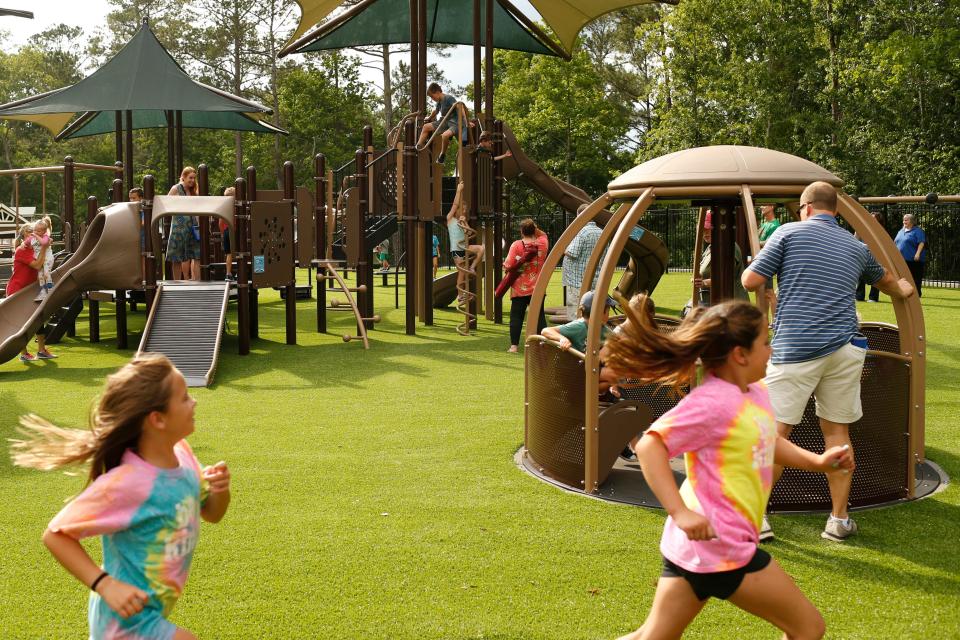How to handle the heat, know the signs of heat illnesses among tips during heat wave
The sun is shining and the summer heat has arrived, but for many Georgians, the temperature will climb to sultry temperatures that can be dangerous. From the Center for Disease Control and Prevention to the Humane Society, here are some recommendations to keep the whole family cool this summer.
Related: National Weather Service issues heat advisory for Athens area
Take it outside, will ya? 10 cool rooftop and patio options to visit as Athens heats up
Tips to keep the house cool
While it’s best to stay in an air-conditioned building during periods of extreme heat, doing so isn’t possible for everyone. For households that have difficulty affording their power bills, the Centers for Disease Control and Prevention suggest contacting the Low Income Home Energy Assistance Program (LIHEAP) or your local health department. Spending time at a shopping mall, public library or emergency cooling center can also help, even if you’re only there for a few hours, as can taking cool showers or baths.
The CDC cautions against only relying on fans to keep cool when it’s really hot because although they might keep you comfortable, they don’t prevent heat-related illnesses. They also recommend using ovens and stoves less in order to maintain a cooler temperature inside the house.
FEMA also offered the following tips to keep cool indoors:
Cover windows with drapes or shades
Weather-strip doors and windows
Use window reflectors specifically designed to reflect heat back outside
Add insulation to keep the heat out
Use a powered attic ventilator, or attic fan, to regulate the heat level of a building’s attic by clearing out hot air
Install window air conditioners and insulate around them
Click here for more advice from the CDC on keeping the house cool during extreme heat.
By the way, need a beach book? Check out these 4 from authors with ties to the Athens area
Heat-related illness
Our bodies usually keep cool by sweating, but during heatwaves, sometimes they aren’t able to cool down fast enough to compete with the rising temperature. According to the CDC, this can cause heat-related illnesses like heat stroke and heat exhaustion that can damage the brain and other important organs.
While those who are older, very young or have chronic conditions are at the greatest risk for a heat-related illness, anyone outside during hot weather can be affected. Other risk factors include high humidity, fever, dehydration, alcohol consumption and sunburn.

The good news is heat-related illnesses are preventable and knowing the warning signs is an important first step to avoiding a medical emergency.
Warning signs and recommendations from the CDC:
Heat stroke is characterized by:
A high body body temperature of 103 F or higher
Hot, red, dry or damp skin
A fast, strong pulse
Headache
Dizziness
Nausea
Confusion
Passing out or losing consciousness
Heat stroke is a medical emergency. Call 911 right away, move the person to a cooler place and help lower their body temperature with cool, wet washcloths or a cool bath. Don’t give them anything to drink.
Heat exhaustion is characterized by:
Heavy sweating
Cold, pale and clammy skin
Fast, weak pulse
Nausea or vomiting
Muscle cramps
Fatigue or weakness
Headache
Dizziness
Passing out or losing consciousness
If you’re experiencing signs of heat exhaustion, move to a cooler place, loosen your clothes, sip water and lower your body temperature with cool, wet washcloths or a cool bath. Get medical help right away if your symptoms get worse, last for more than an hour or you start vomiting.

Heat cramps are characterized by:
Heavy sweating during intense exercise
Muscle pain or spasms
If you’re experiencing heat cramps, stop physical activity, move to a cool space, drink water or a sports drink and wait for the cramps to go away before doing any more physical activity. Get medical help right away if you’re on a low-sodium diet, have heart problems or your cramps last for more than one hour.

Preventing heat-related illness
Heat-related illnesses can cause medical emergencies, but there are plenty of things you can do to reduce your risk of getting one and beat the heat.
The CDC recommends staying cool and being careful during outdoor activities.
If you are spending time outside, wear lightweight, loose-fitting and light colored clothing and apply sunscreen (sunburn makes it harder for your body to cool down and can make you dehydrated). The CDC recommends putting on sunscreen of SPF 15 or higher 30 minutes before going out and reapplying it according to the instructions on the package.
Be careful when you’re outside. Cut down on outdoor exercise when you can, and try not to over-exert yourself when you can’t. If possible, limit your time outside to the morning and evening, when the weather’s coolest and take breaks in the shade.
If your heart is pounding and you find yourself gasping for breath, lightheaded, confused, weak or faint, stop what you’re doing, find a cool place and rest.
Drink lots of fluids, no matter how thirsty you are, and talk to your doctor if you have a medication or condition that limits your water or salt intake. The CDC says that sports drinks can help replace salt and minerals you lose by sweating, but it cautions against sugary or alcoholic drinks, since they can cause you to lose more fluids. Similarly, hot and heavy meals can make you warmer and should be avoided.
It’s also important to look out for pets and those at higher risk of heat-related illness – including children, elders, adults who work or exercise outside.
Pet safety
Southerners are sweating it out in the heat, but one thing that could make it seem even hotter would be wearing a fur coat. For pet owners, make sure your pets have access to plenty of fresh, cool water.
When going outside with your pet, make sure to consider the temperature of the pavement.
Never leave pets unattended in the car when it is hot outside, even with the air conditioning on, according to the Humane Society.
Pets evaporate moisture from their lungs by panting. If it is too humid outside they are more likely to overheat. Check on the humidity level before taking your pet outside.
If your pet is suffering from heat stroke, the Humane Society recommends moving your pet to a shaded or air-conditioned area and applying ice packs or cold towels to their head, neck and chest. Let them drink small amounts of water or lick an ice cube, and transport them to a veterinarian.
This article originally appeared on Athens Banner-Herald: Cooling tips for the summer heat in Georgia

